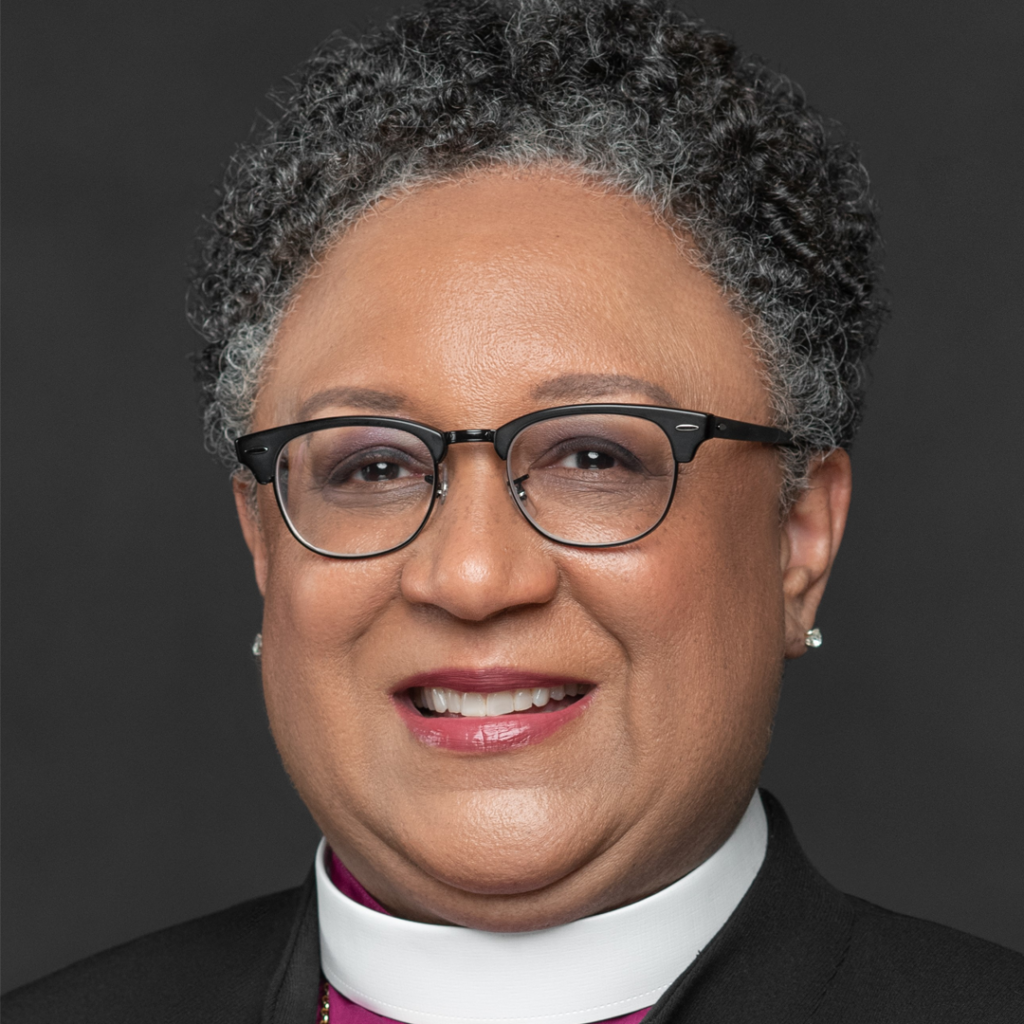Weekly Bulletin Inserts
Bulletin Insert: Week 2: Reflections on the Resurrection – May 1, 2022
During the Easter season, Sermons That Work is pleased to present reflections from bishops of The Episcopal Church on the resurrection of our Lord. Check back each week for a brief exploration of how Jesus Christ’s rising from the grave changes everything. To listen to this reflection, scan the QR code on this page and subscribe to the Sermons That Work podcast.

In the Gospel of Mark, the women in the resurrection narrative find an empty tomb, but no signs of Jesus. How would you respond if all you encountered was an empty tomb? Would you believe Jesus was alive?
On the one hand, we have the benefit of 2,000 years of Easter celebrations. We know how the story ends. However, the events of the past few years have placed many of us in the posture of the women from Mark’s Gospel. We’ve lived through multiple pandemics: COVID-19, dramatic weather patterns indicating an environmental crisis, a political system which seems broken almost beyond repair, and the acknowledgement of systemic racism embedded in all aspects of American life. At times, it has felt like the empty tomb on Easter morning as we searched for signs of God’s presence in the midst of so much pain and despair. Do we believe Jesus is alive?
The women’s response to the empty tomb can help us navigate our current circumstances. In order for the women to experience the risen Lord, they had to return to Galilee. Returning to Galilee entails going to the margins, far from the bright lights of the city. Galilee was the place where Jesus healed the sick and fed the hungry, where he drove out demons and preached words of hope, where he restored people to community. In Galilee, we look beyond our own needs and respond compassionately to others. And that’s where we’ll find God, among the least, the lost and the lonely.
Intractable problems aren’t easily resolved but we can make a difference when we collaborate with others as partners in God’s vineyard. The question is whether we are willing to journey to Galilee and commit ourselves to the ministry of repentance, reconciliation and restoration. The resurrection isn’t a one time event which occurred 2,000 years ago – it has implications for how we structure our lives today. We participate in the resurrection when we work to make the kingdom of God manifest on earth.
Beloved, resurrected life is available this side of the grave. There’s an assignment with your name written on it and it’s waiting for you in Galilee. In this season of Easter, may we courageously share the love of God with our fellow companions and everyone we encounter along the way. The Good News of Jesus Christ is too amazing to keep to ourselves. So let’s journey together to Galilee. Amen.

This reflection was written by the Rt. Rev. Phoebe Roaf. Bishop Roaf grew up in Pine Bluff, Arkansas. Following her work as a public policy analyst and an attorney, she was ordained as a priest in the Diocese of Louisiana. She served congregations in New Orleans and Richmond, Va., prior to her ordination and consecration as the 4th Bishop of the Diocese of West Tennessee on May 4, 2019.
1 de mayo de 2022 – Pascua 3 (C)
Semana 2: Reflexiones sobre la Resurrección
Durante el tiempo de Pascua, Sermones que iluminan se complace en presentar las reflexiones de obispos de la Iglesia Episcopal sobre la resurrección de nuestro Señor. Revise cada semana para una breve exploración de cómo la resurrección de Jesucristo de la tumba lo cambia todo.
En el Evangelio de Marcos, las mujeres en la narración de la resurrección encuentran una tumba vacía, pero ninguna señal de Jesús. ¿Cómo respondería si todo lo que usted encontrara fuera una tumba vacía? ¿Creería que Jesús estaba vivo?
Por un lado, tenemos ventaja de 2000 años de celebraciones de la Pascua. Sabemos cómo termina la historia. Sin embargo, los acontecimientos de los últimos años nos han puesto a muchas de nosotras en la postura de las mujeres del Evangelio de Marcos. Hemos vivido múltiples pandemias: COVID-19, patrones climáticos dramáticos que indican una crisis ambiental, un sistema político que parece roto casi sin posibilidad de reparación y el reconocimiento del racismo sistémico arraigado en todos los aspectos de la vida estadounidense. A veces, se ha sentido como la tumba vacía en la mañana de Pascua mientras buscábamos señales de la presencia de Dios en medio de tanto dolor y desesperación. ¿Creemos que Jesús está vivo?
La respuesta de las mujeres a la tumba vacía puede ayudarnos a navegar las circunstancias actuales. Para que las mujeres experimentaran al Señor resucitado, tenían que regresar a Galilea. Regresar a Galilea implica ir a los márgenes, lejos de las luces brillantes de la ciudad. Galilea fue el lugar donde Jesús sanó a los enfermos y alimentó a los hambrientos, donde expulsó demonios y predicó palabras de esperanza, donde restauró a personas a la comunidad. En Galilea, miramos más allá de nuestras propias necesidades y respondemos con compasión a los demás. Y ahí es donde encontraremos a Dios, entre los últimos, los perdidos y los solitarios.
Los problemas intratables no se resuelven fácilmente, pero podemos marcar la diferencia cuando colaboramos con otros como socios en la viña de Dios. La pregunta es si estamos dispuestos a viajar a Galilea y comprometernos en el ministerio del arrepentimiento, la reconciliación y la restauración. La resurrección no es un evento de una sola vez que ocurrió hace 2000 años, tiene implicaciones sobre la forma en que estructuramos hoy nuestras vidas. Participamos en la resurrección cuando trabajamos para que el reino de Dios se manifieste en la tierra.
Querida lectora, la vida resucitada está disponible de este lado de la tumba. Hay una tarea con el nombre de usted escrito en ella y le está esperando en Galilea. En esta temporada de Pascua, que podamos compartir valientemente el amor de Dios con nuestras compañeras y con todos los que nos encontremos en el camino. Las Buenas Nuevas de Jesucristo son demasiado asombrosas para guardarlas para nosotras. Así que viajemos juntos a Galilea. Amén.

Esta reflexión fue escrita por la Rvdma. Phoebe Roaf. La obispo Roaf creció en Pine Bluff, Arkansas. Luego de haber trabajado como analista de políticas públicas y abogada, fue ordenada sacerdote en la Diócesis de Luisiana. Sirvió en congregaciones en Nueva Orleans y Richmond, Virginia, antes de su ordenación y consagración como cuarta obispa de la Diócesis de West Tennessee el 4 de mayo de 2019.
Don’t forget to subscribe to the Sermons That Work podcast to hear this sermon and more on your favorite podcasting app! Recordings are released the Thursday before each liturgical date.
Receive Free Weekly Sermons That Work Resources!


